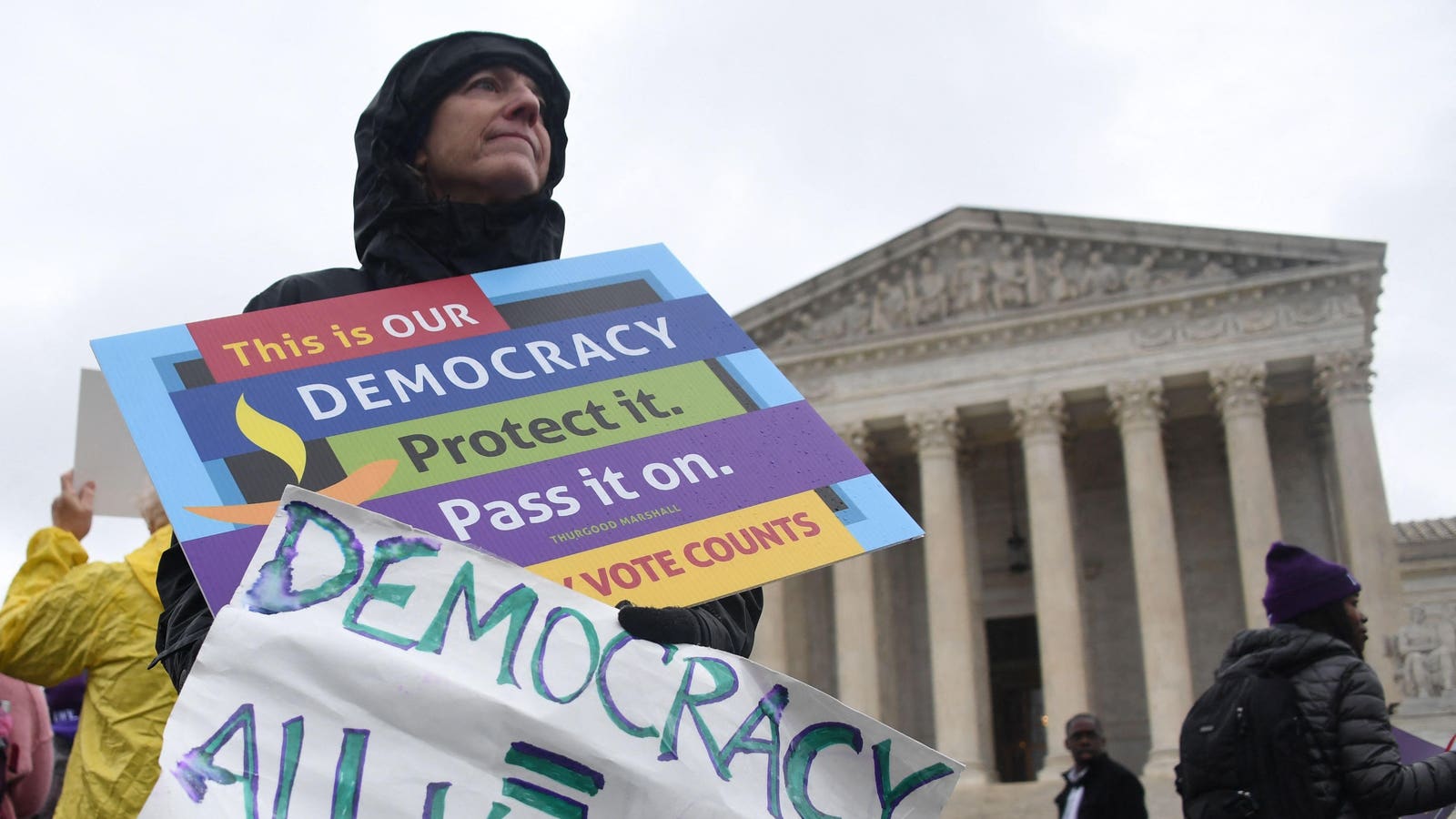The Supreme Court is now considering its first last-minute voting lawsuits ahead of Election Day, as justices have been asked to weigh in on disputes in Virginia and Pennsylvania—the first of an expected slew of last-minute voting lawsuits as the election nears.
Demonstrators gather in front of the US Supreme Court in Washington, DC, on December 7, 2022.
AFP via Getty Images
Key Facts
The Republican National Committee asked the Supreme Court Monday to block a Pennsylvania Supreme Court ruling allowing voters to cast provisional ballots if their mail-in ballots have errors, like lacking a signature or date on the envelope.
That means if the Supreme Court sides with the RNC, those Pennsylvania voters will not be able to vote at all—which could make a difference in the battleground state, where former President Donald Trump and Vice President Kamala Harris are running neck-and-neck.
Virginia Attorney General Jason Miyares also asked the Supreme Court Monday to nullify a lower court ruling that blocked the state from carrying out a purge of its voter rolls to remove 1,600 alleged noncitizens, which the federal government noted resulted in U.S. citizens being removed in error.
The Justice Department argued removing the voters is unlawful because it was done too close to Election Day, as federal law bars states from removing voters from voter rolls less than 90 days before an election, and lower federal district and appeals courts sided with the federal government, ordering Virginia to restore voters to the voter rolls.
The cases are the first in an anticipated slew of last-minute cases over state voting rules expected to make it to the Supreme Court before Election Day.
The court is also weighing two cases from independent candidate Robert F. Kennedy Jr.—who suspended his campaign and endorsed former President Donald Trump—as he has asked the court to take his name off the ballot in Michigan and Wisconsin, despite voting already being underway.
What To Watch For
The court has asked the federal government to respond to Virginia’s petition by Tuesday afternoon, and a ruling on the state’s voter rolls is likely to come soon after. The Pennsylvania voters and election officials who the RNC’s lawsuit was brought against have until Wednesday afternoon to respond in that case. It remains to be seen how many more disputes the high court will be asked to take up before Election Day.
What We Don’t Know
If and how the Supreme Court could affect the election. Trump and his allies asked the court in 2020 to take up a series of post-election disputes challenging President Joe Biden’s win, as the ex-president fought in court to try and overturn the election results. The Supreme Court uniformly rejected all of those challenges, but it remains to be seen how the 6-3 conservative court will act if asked to weigh in on any post-election challenges again this cycle. Justices already gave Trump a win ahead of the general election by swatting down efforts by Democrats to disqualify him from state ballots under the 14th Amendment, ruling states cannot remove federal candidates.
Surprising Fact
The Supreme Court seemingly gave itself more leeway to shape states’ election rules with its 2023 ruling in voting case Moore v. Harper, Vox notes. The court struck down a legal theory in that case that Trump and his allies tried to use to overturn the 2020 election, which claimed state legislators should have widespread authority to determine election rules—a power Trump wanted state lawmakers to use to reject their states’ election results and declare Trump the winner. That being said, justices also ruled state courts can’t oppose state legislators’ election rules in a way that “exceed[s] the bounds of ordinary judicial review.” The court didn’t clarify exactly what that means in practice and what those bounds of ordinary review are, but Vox notes the ruling could make it easier for the Supreme Court to overrule state courts and side with state legislators, if the justices believe those courts have acted improperly.
Key Background
Both Republicans and Democrats have brought dozens of lawsuits challenging voting rules ahead of Election Day, particularly as Trump and his allies have sowed distrust in election results and the electoral process. The RNC has launched a massive “election integrity” effort targeting voting practices the party believes will enable voter fraud—even as evidence shows such fraud is exceedingly rare and there is no evidence of widespread electoral fraud in recent elections. As GOP-led states have tightened voting rules in response to Trump’s fraud claims, Democrats have also filed numerous lawsuits seeking to expand voter access. While legal battles have been playing out in the courts for months, legal rulings have ramped up ahead of Election Day, and Marc Elias, a voting rights attorney aligned with the Democratic Party, said Sunday 199 challenges remain pending in 40 states.
Further ReadingForbesHow Courts Are Impacting 2024 Election: Court Blocks Virginia’s Last-Minute Voter Roll PurgeBy Alison Durkee
